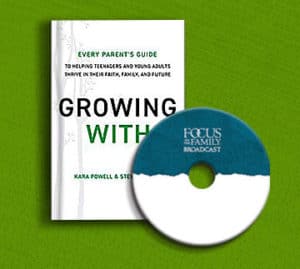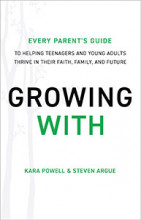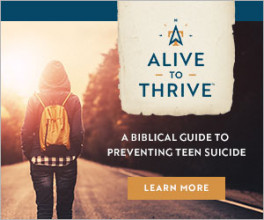Opening:
Excerpt:
Dr. Kara Powell: We can grow with our kids. And the way that we define “growing with” is a mutual journey of intentional growth for both ourselves and our kids that trusts God to transform us all.
End of Excerpt
John Fuller: That’s Dr. Kara Powell describing what it’s like to grow with your children as they reach those young adult years. And she’s back with us today on Focus on the Family. Your host is Focus president and author Jim Daly, and I’m John Fuller.
Jim Daly: John, last time we spoke with Dr. Kara Powell about what it means to do life with your children. I love that, that idea of “with” your children, not against your children. If you missed it, be sure to get a hold of us. Get this CD or download from the website. John, you’ll give those details. But today, we’re going to discuss how you can be that godly example for your children, even if they’ve drifted away from following Christ. I know this is a heavy topic, but we have to address it because we get calls from many of you who have a teenager or young adult in their 20s who is moving farther and farther from God, and that is a heavy burden for your heart. But there’s hope. And if you find yourself in that position, we’re gonna be here for you today. I want you to call us, talk to a counselor. Let us be there, and let us give you some resources, especially the one of our guest today.
John: Yeah. That book is Growing With, and as I said, Dr. Kara Powell is with us. She’s a researcher. And, this book really offers some great tools for, as you said, Jim, doing life with your teen and then helping them launch well into adulthood. We’ve got the book and a variety of other help for you at focusonthefamily.com/broadcast, or if you’d like to call and talk to one of our counselors, our number is 800-A-FAMILY.
Body:
Jim: Kara, welcome back.
Kara: It’s great to be here with you both.
Jim: (Laughter) Let me start where we stopped last time, and that was on faithing.
Kara: Yeah
Jim: And we were gonna get more into that. We gave a little bit of a definition of that, but just restate the definition for the new listeners today.
Kara: Yeah. And let me give you the definition that I actually came up with Steve Argue, my friend and colleague from Fuller, which is faithing is owning and embodying our journeys with God, as we as parents, as well as our kids encounter new experiences and information.
Jim: Huh.
Kara: So, it’s always about encountering, growing, realizing that our faith is changing and there’s new experiences awaiting us.
Jim: Well – and I think, you know, generations change, too. There’s more access to information. There’s more bad information. The social media platform gives us everything, good and bad. In fact, it’s no secret that many young people are struggling with doubts about their faith. I was kind of shocked by this bit of research that you use in the book, that about 70% of teens in the church have admitted to having serious doubts about their faith. Yet less than half have shared their doubts with an adult friend. That 70% – I would think almost 100% at some point would have doubts. But, explain what that is getting at.
Kara: Well, I’m glad you mention that, Jim, because that’s 70% of youth group seniors admit to having significant doubts about faith, so it…
Jim: Yeah.
Kara: it probably is higher.
Jim: Yeah.
Kara: It’s what they report themselves.
Jim: I think that’s a good thing, though. I don’t – I don’t mean that in a bad way, but I think that means they’re struggling with it.
Kara: Yeah.
Jim: They’re actually asking questions in their heart.
John: Yeah, they care.
Jim: The downside is, they’re not talking to anybody that has answers, it sounds like.
Kara: Yeah. So, you know, at least 70% have doubts. And I know sometimes as – as parents or grandparents, leaders, we might get freaked out about that. We think, “Oh, my goodness. Young people have all these tough questions.” But the good news out of our research is that when young people had the opportunity to express and explore those doubts, that was actually correlated with greater faith, both in high school and in college. So, let me put that more simply. It’s not doubt that is toxic to faith. It’s silence…
Jim: Wow.
Kara: …that is toxic to faith. And that’s part of what I love, even about making “faithing” a verb. I think a lot of times, we think about faith as a noun in Scripture, and it certainly is. It’s a noun, but it’s also a verb. It’s growing, and changing and evolving. And I want, as a parent – I want to be able to talk about that growth and that – some of those shifts and questions with my own kids. I would far rather us be able to have that conversation than for my kids to fall into the category of young people across the country who have questions and aren’t sharing them with any adult. And that’s when doubts become toxic.
Jim: Well, give us that story. Where with your kids have you done the faithing, and they’ve expressed doubts and you’ve helped them?
Kara: Yeah, yeah. So, two of my favorite questions, as my kids are a little bit older, to ask – are these two. “What do you now believe about life and faith that you think I don’t believe? And what do you no longer believe about life and faith than you think I do believe?” Now, I’ll tell you. I ask those questions, and sometimes my teenagers will shrug and say, “Oh, you know, I think nothing’s really changed, Mom.” And sometimes I ask those questions, and they’ve got two or three things that they’ve been thinking about that are a little different than I – than they think I believe. But I – again, I just want them to be able to have that conversation with me.
Jim: Yeah.
Kara: And when I bring it up – I mean, even the essence of those two questions – “What do you no longer believe that you think I do believe? What do you now believe that you think I don’t believe?” – even just the essence of those two questions acknowledges that we’re going to have potentially slightly different views, and that’s OK. We can talk about it. We can…
Jim: Yeah.
Kara: We can keep having the conversation.
Jim: You know, the – the other thing that I’ve observed is catastrophic- is events; be in tune as a parent. And unfortunately, you know, so many young people are considering taking their life, et cetera.
Kara: Yeah.
Jim: And we’re at a school where that has happened. And in one occasion, I know of somebody who was befriending this person, this young person. They were talking to them about the Lord and about the Scripture, praying for them, and in the end, in their mind, it didn’t work, obviously. And it started to separate them from their own relationship with the Lord. But that moment, for a parent, to be able to recognize what’s going on in your teen, particularly, or your 20-something so you can step in and provide perspective, that answers to prayer come in a lot of different ways. And sometimes we don’t get our prayers answered exactly like we think we should. And it – that’s a powerful moment, isn’t it?
Kara: Yeah. I’m – I’m so glad you mentioned challenges of suicide, anxiety, depression, Jim, because, uh…
Jim: It seems this generation is really struggling with these issues.
Kara: And – and the – the data is showing that. And, what’s interesting about risk behaviors for teenagers, specifically, is that some risk behaviors are down, nationally. Premarital sex, partying, alcohol, drug use is actually a little bit down in the last eight to ten years. But suicide, anxiety, depression are actually up. And it’s hard to say exactly why. There are some – and I think this may be valid – there are some who think it’s correlated with technology and cellphone use that…
Jim: Isolation.
Kara: Yeah – that risk behaviors that involve somebody else – partying, sex, drugs, alcohol are down, but risk behaviors that involve that young person being in their room, seeing what everybody else is doing, those are up. You know, when I was a teenager, if I wasn’t invited to a Friday-night party, I didn’t know that I wasn’t invited, until maybe Monday morning and people were talking about it. But now teenagers who aren’t invited to a Friday-night party or just a Friday-night gathering, they see it unfolding on their devices in real time. So, there’s a lot of abandonment and rejection, and just feeling left out. I mean, I got to say, if I was a teenager right now, I think I’d be struggling with anxiety and depression.
Jim: No, yeah, think about that.
Kara: Yeah, so – so I think for a parent to really be sensitive to any changes in behavior, or affect – I’m not a psychologist, but I know that, you know, any kind of significant change in behavior or affect…in your young person is something to try to talk about, talk about with your young person, talk about with a trained professional. Pay attention to that. So, I’m glad you mentioned it, Jim.
Jim: Yeah. One of the things we’ve done here at Focus on the Family – we created Alive to Thrive, which is really meant for parents, for youth workers, for pastors so they can understand those signs. And I know this isn’t the theme of what we’re talking about.
Kara: Yeah.
Jim: But it’s a critical issue in the culture today.
Kara: If we’re talking about young people…
Jim: Yeah.
Kara: …we have to talk about it.
Jim: Let me ask this. What do parents need to do to strike a balance between being involved in their children’s faith journey, while not trying to control it?
Kara: Oh.
Jim: And that’s the challenge of all of us.
Kara: Yeah.
Jim: We want to see the product, the outcome. We’re rooting for it.
Kara: Yeah.
Jim: We can over-control these things.
Kara: Yeah.
Jim: And then when the kids leave the home at 18, 19…
Kara: Yeah.
Jim: …What you see, at a university level…
Kara: Yeah.
Jim: These kids come in, and they’re not equipped to live life independently.
Kara: Yeah. Yeah. Absolutely. Well, what I’m trying to do, as a parent, is trying to figure out how to help my kids figure out what life with Jesus looks like for them. My kids are not miniature versions of Kara Powell. They have a slightly different approach to growing with Jesus.
Jim: Man, that’s a good outcome.
Kara: Yeah.
Jim: I mean, that’s a good thing to know…
Kara: Yeah.
Jim: …but tough to get there.
Kara: So since my kids were in fourth grade, out of our research – it started in fourth grade, because that’s how old our oldest was when we really started unearthing some of this initial data. I’ve been asking my kids, “When do you feel closest to God? When do you feel closest to God?”
Jim: That’s a great question.
Kara: Yeah.
Jim: I love that.
Kara: And what’s fascinating is each of our three kids has a different answer to that question. So, Nathan, our oldest – he feels closest to God when he’s involved in worship music. Our mid-child, Krista, she’s an off-the-chart extrovert. So, when I ask her, when do you feel closest to God? – for her, it’s when she’s at church with her friends. And so, we make time with her church friends a real priority. For our youngest, Jessica – she’s 13. She’s more of an introvert. She loves outdoors. For her – “Jessica, when do you feel closest to God?” “When I’m outdoors by myself” has been a common theme in her answer.
Jim: I like that one.
Kara: And so yeah.
(LAUGHTER)
Kara: Maybe that’s more your answer. And so, we make sure that we get her that time that she needs outdoors. And so, you know, I feel closest to God, Bible in one hand, journal in the other. So far, that’s not my kids’ answer. And so, I’m trying to help them figure out the practices that really work for them that are different…
Jim: Yeah.
Kara: …than the practices that work for me.
Jim: I’m kind of – I always think in odd ways sometimes. So I’m thinking, what child has said, “Yeah. I feel closest to God when Mommy’s reprimanding me”?
Kara: Yeah. Right.
(LAUGHTER)
Kara: Exactly.
Jim: It probably doesn’t exist.
Kara: Exactly.
Jim: “When Mommy’s disciplining me…”
Kara: Yeah.
Jim: “I feel close to God.”
Kara: You know, I think a related question, Jim, for parents of teenagers is, what do you do when your – when your teenager doesn’t want to go to church?
Jim: Yeah.
Kara: And do you make them go to church? We get asked that a lot. And so, you know, what Steve Argue, my co-author of Growing With, and I would say is, it is important, I would say, until your kid is – he has graduated high school, that they stay connected with the faith community.
Jim: And be part of the family.
Kara: And be part of the family of faith. But that doesn’t have to mean your church. So, you know, what I would say to parents is, work with your teenager and help your teenager find the faith community that works best for them.
Jim: Right.
Kara: And, our kids love our church. Like, when we go away for the weekend, our kids say, “Can we come back on Sunday morning for church?” So right now, our kids are just head over heels about our church, which is a huge blessing. But if our kids ever got to the point where they felt differently about our church, you know, I would be willing to help them think about attending other churches, or another youth group for, you know, even a short amount of time. I tell parents all the time, you know, I can listen to worship CDs. I can stay in touch with my friends in small groups other ways. I would say to a parent, you know, really support where your young person feels at home and make that a priority, at least through 12th grade.
John: Well, this is Focus on the Family with Jim Daly. And our guest is Dr. Kara Powell. We’re talking about the book she wrote with Steven Argue. It’s called Growing With. And, of course, we have it here at Focus on the Family. And let me invite you to call us. And we can tell you more. Or go online. You’ll find the book and a CD bundled together. Our number is 800, the letter A and the word FAMILY. And online,
Jim: Kara, let’s go back to adulting. We talked about that last time.
Kara: Right.
Jim: If you missed it, get a hold of us, and get the program from last time, because it was filled with great information.
John: Mmm hmm.
Jim: But I want to continue in that “adulting” conversation. Parents really play a key role in helping their children build healthy relationships as they get older.
Kara: Mmm hmm.
Jim: This is also a time when your children become more interested in talking about things like dating and marriage. We’ve seen that with our boys.
Kara: Yeah.
Jim: I mean, the older they get, the more engaged they are to talk about these things.
Kara: Yeah.
Jim: I’m seeing it in my 18-year-old big-time right now.
Kara: Yeah. Yeah.
Jim: I mean, we’re having those man-to-man discussions. It’s a little scary, actually. He’s, like, no longer my boy.
Kara: Yeah.
Jim: He’s my co-man.
Kara: Yeah.
(LAUGHTER)
Kara: Is he bringing up the conversation with you, or are you?
Jim: Yeah. It can. It can go both ways.
Kara: Yeah. Yeah.
Jim: But I love it.
Kara: That’s awesome.
Jim: But it’s like – it’s a little frightening for me, as Dad.
Kara: Yeah. Yeah.
Jim: It’s a little unnerving.
Kara: Yeah.
Jim: But it’s good.
Kara: Yeah.
Jim: It’s a healthy thing. But in that context, especially for that middle-ground area – probably, you know, 16 to, say, 23…
Kara: Mmm hmm.
Jim: Those can be difficult conversations.
Kara: Mmm hmm.
Jim: How did you and your husband, Dave, manage that, so far…
Kara: Yeah. Yeah.
Jim: …with your kids?
Kara: Yeah. Well, I think, in some ways, the ideal is to lay a good foundation for having those conversations even earlier than that.
Jim: Right. So it’s not coming out of left field.
Kara: Yeah. So…
Jim: Like, “Whoa. Mom, why are you talking about that with me now?”
Kara: Yeah. Yeah.
Jim: OK.
Kara: So, you know, how Dave and I handled that when our kids were in middle school is – we didn’t want it just to be one conversation about sex. We wanted it to be a series of conversations about sex. So, we got a book, and with each of our kids, one at a time, we read through the book with them. And we highlighted certain passages ahead of time, before we handed the book to them, so that they knew that those passages were the ones we wanted to make sure that we talked about together. And then, you know, that child got to keep the book when we were done. What’s interesting is one of our children really liked the conversation that we had. Another child seemed kind of indifferent, and one child didn’t really like the conversations all that much. So, every child has a different response.
John: They all have different reactions, yeah.
Kara: Yeah – which is part of what keeps us on our toes as parents, right? We’ve got to keep responding to the unique child who’s in front of us. But at any rate, if – you know, for parents whose children haven’t yet crossed that fourth-, fifth-, sixth-grade line, I do recommend that, if possible, you have not just one conversation, but a series of conversations, because that creates a norm that sends the message that we can keep talking about this. So that’s the first thing I would say. The second thing that I would say – and the reason that I asked Jim if it was your son bringing up the conversations with you, or you with him – and you said both – is, you know, when your child is, say, a late teenager – late high school, early college – intimacy and good conversations are usually on their terms.
Jim: Right.
Kara: It’s not so much when I want to have a good conversation. It’s when they want to have a good conversation, which means I, as a parent – I’ve got to be ready to drop everything.
Jim: Even at 11 o’clock at night (laughter).
John: Yes. Oh.
Kara: Exactly. Especially at 11 o’clock at night.
John: Yeah.
Kara: Or, especially when I’ve got a big deadline for work that I’m trying to hit, and that’s when they want to talk, or especially when I’m exhausted, and that’s when they seem to want to explore something verbally with me – whatever it might be. And so, you know, that’s something that I’m continuing to learn, is just how important it is, when my child brings up something, or seems just a little bit open, to really prioritize the conversation then. And then I guess the third thing I would say when it comes to sex is, you know, as Dave and I think about Nathan, our 12th-grader heading to college – as much as we would love that he feels comfortable talking to us about anything, we know that there are certain topics that he will feel more comfortable, at times, talking to a nonparent about. And so, we’ve already started talking with him about, you know, who’s the adult, that if you make a mistake, if you blow it, if there’s something you need to talk through, that you can go to, if you don’t feel like you can come to us? I mean, Nathan, we would love for you to come to us.
Jim: That’s good.
Kara: Don’t get me wrong, Nathan. We would love for you to come to us. But, just in case, who’s that adult? And we want him to know who that adult is. We’re gonna have him tell that adult ahead of time, “Hey, you’re my go-to person…”
Jim: I like that.
Kara: …And so that Mark will know if Nathan texts at 1 o’clock in the morning that it’s probably something important. So, that’s also part of the system, the web of relationships we’re trying to create for our kids.
Jim: That is really good. You know, I’ve got to give a – a shout-out to Jean, because she is so good in the late-night conversation…
Kara: Yeah.
Jim: ‘Cause I’m a morning person.
Kara: Yeah.
Jim: I’m like, “Can you talk to your mom?”
Kara: Yeah, right (laughter).
(LAUGHTER)
Kara: It’s right.
Jim: I mean, really, I am not going to understand what you’re saying anyway, so (laughter) – but Jean does a great job of that late-night conversation.
Jim: Kara, let me ask you, too – this is a more delicate question, or comment.
Kara: Yeah.
Jim: But when you look at the culture today, the LGBTQ issue…
Kara: Yeah.
Jim: …is so – I don’t even know how to describe it. It’s just so prevalent.
Kara: Yeah.
Jim: And I know that the stats, the data – at least that you cite – 3.7% of men struggle with same-sex attraction, about 4.4% of women. And, you know, that – in the scope of things, it’s a small number of people.
Kara: Yeah.
Jim: It doesn’t eliminate the struggle, and I’m not trying to downplay that, but the prominence that it has in the culture today – I think the question I want to ask is two-fold – one, for the parent who’s concerned, or has had that discussion with their teen or 20-something, that maybe their sexual identity is not where they had hoped it would be, coming from a Christian home, particularly. And then what – what is a good response? How do parents manage that within the context of their faith?
Kara: Mmm hmm. Oh. Fantastic…
Jim: This is big. I mean, this is big.
Kara: Fantastic questions, Jim, and not easy to answer in quick soundbites. I think what I want to say first is of all the parents we’ve interviewed over all the years, the quote that stands out to me the most – we interviewed this parent of – of 20-somethings. And he actually was citing his wife, who said one of her favorite quotes is, “As long as I have relationship, I have influence.”
Jim: Right.
Kara: “As long as I have relationship, I have influence.”
Jim: Yeah.
Kara: And I think about that, when I think about parents who are – are having their child do something that is breaking their heart and causing them grief and anguish. I know it might be tempting to sever the relationship, but – or – or distance yourself from the child. But, as I look at the data, as I look at the families that we’ve studied, my recommendation is to try to figure out how to keep having relationship. Go ahead and communicate what you disagree with, once or twice. I think, often, our 20-something kids know where we stand on moral issues, and so, we don’t need to communicate it, over and over again. And there might be certain boundaries you might feel you need to draw in some ways, but I would say keep loving; keep empathizing.
Jim: Yeah. I like that.
Kara: Keep reaching out to your young person, because, again, it goes back to what we’ve talked about yesterday and today. You want to be that wall of unconditional support. You want to be that wall of stability, so that when they’re ready to come back to you, they know that you are there for them. And so…
Jim: Yeah.
Kara: So, that’s what I would want for parents.
Jim: No, I like that response. And I think – the reason I’m raising it, in case you’re concerned, while you’re listening, going, “Why would you give it any time?” – we get calls from people, parents who are struggling within the church with this issue. So, I – I just want to be upfront with that.
Kara: Yeah.
Jim: But also, you know, one of the things, Kara, that I’ll try to say is that we’re not authors – we’re not authors of the book. We’re followers of it. And we can speak to theologians, but you look at the book of Romans, these are difficult things.
Kara: Yeah.
Jim: And it – tolerance has a place in the Christian life. I think – you know, much of what Jesus talked about was tolerance towards sinners, certainly – woman at the well, woman caught in adultery. It’s instruction, and its tolerance for the fact that we’re sinners saved by grace.
Kara: Yeah.
Jim: I mean, I believe that’s God’s attitude. But tolerance can’t be the – the king.
Kara: Yeah.
Jim: I mean, we have to recognize that there – for the Christian, there is a prescription there of sanctification. And – and that’s a difficult issue.
Kara: Yeah.
Jim: Let me broaden the question now because I think this will hit more homes, more parents. What about that daughter, that son, that’s dating the unapproved person, that that person is just not the right person for you? And there’s that mama’s instinct. You know what I’m saying.
Kara: Yeah.
Jim: What do you do with that, when you are realizing this person isn’t the right person for your daughter?
Kara: Yeah.
Jim: Or for your son.
Kara: Yeah. I haven’t had that happen to me yet, but I think what I would – what I would want to do is – I’ve heard a great phrase in evangelism, which is, you give a gentle tug to somebody and see if they’re ready to hear – about Jesus, in this case. You know, just like with fruit to know whether it’s ripe, you give a gentle tug.
Jim: Right.
Kara: And I think that’s what I would do with my son or daughter, is – is say, “Hey. Can I tell you something that I’ve noticed in this relationship?” And see how they respond. If they don’t respond positively, then I would not say it.
Jim: You have to honor that.
Kara: I would – yeah. And…
Jim: Boy, that’s so tough.
Kara: It’s so tough. And before our research, I think I would have pushed through and said it anyway.
Jim: Now, why? What’s the research telling you?
Kara: Well, because, um, what the research is saying is that – what we’ve found when we interviewed parents is they almost always said, if your child wasn’t open to your input, then they weren’t going to hear it anyway, and you might do damage to the relationship.
Jim: Can I also add this?
Kara: Yeah.
Jim: Does – does it show that when you respect that boundary, if – if they’ve said, “No, I don’t want your input,” and you respect that, that over time, then they do?
Kara: And you can give that gentle tug later, and then they would be open to it, too.
Jim: Right. That’s really interesting. I think that’s an insight to the human heart.
Kara: Yeah.
Jim: …The way God has wired us.
Kara: Yeah, absolutely. And so, as a parent, biding your time, praying for wisdom to know the right time to share what you’re observing – I mean, I think there’s other ways, if – you can ask, “What do your friends think about this relationship? What do your mentors think about this relationship?” You know, you can encourage your young person to get wisdom from other sources, other than you.
Jim: That’s good, so you’re not the only – yeah.
Kara: And even say, “You know, if you were” – sometimes I like to ask my kids, you know, “What do you love about this relationship?” And “what do you wish for to – was different about this relationship?” And let them kind of process it also.
Jim: Give them some thinking.
Kara: Yeah. But let them start with positive, and then go, and then let them critique their relationship, also.
John: Yeah.
Jim: OK. This is really good, Kara. And I’m so glad we’re touching on these difficult issues. I’ll – I’ll take it to another level.
Kara: Yeah.
Jim: So, you have the not-so-good boyfriend or girlfriend that you’re worried about. Unfortunately, today, too, especially in that 20-something range, cohabiting is a far more common thing for Christian young people. You know, to abstain before marriage is not always done. And how do you address that as a parent? I mean, now you’re – “Mom, I’m going to go ahead move in with this guy.” “What?” I mean, that’s, again, a fairly common question we get here at Focus.
Kara: Yeah. And I actually think – I think this is one of the big secrets in the church, Jim – how many parents and grandparents have their kids and grandkids who are doing just that.
Jim: Right.
Kara: So, I think a lot of the same principles apply. You know, I – A, I think your child probably already knows how you feel. So I would – I would communicate your displeasure, maybe once, maybe twice. But, I would look for ways to continue to support other aspects of your child’s life that you are really pleased with, and the…
Jim: And what’s – what’s really important, too, though, is describe for me how you express that displeasure. I mean, there’s different ways to do that. In some ways, it will really harm the relationship. In other ways, you’ll be heard, hopefully respected, but maybe not embraced.
Kara: Yeah. Yeah. Well, I think I found with my kids that when I speak in anger, that doesn’t work. But when I communicate in love about what I think is the most loving thing for them, they’re – they are more – so much more likely to hear. And I’ll go to the research. The best research shows that 3 out of 4 parents report that their relationship with their young person improves after age 18.
Jim: (Laughter).
Kara: So that’s good news for all…
Jim: That’s good news.
Kara: …Of us – all – for all – I mean, for all of us. Odds are really good that our relationships are going to improve, we’re going to have less conflict, and we’re gonna experience truly what it means to journey with, to grow with our kid. It might take longer than we wish. The road not – might not be smooth. There’s gonna be bumps, and there’s going to be curves. But if we take the long view, we can be hopeful.
Closing:
Jim: Wow. Kara, this has been fantastic. I so appreciate the time with you and just your vulnerability in speaking what the research is saying and what your experience as a professor is showing you. I really appreciate it, along with Steve Argue, your partner in the research in the book, Growing With. In fact, I can’t think of a better resource to get into your hands as a parent, between a parent with kids between the ages of 13 to 29. This is, like, the manual (laughter) you need right now. And we’ll even bundle it, along with a CD of this conversation, with the book, for a gift of any amount. And we’ll send that to you as our way of saying thank you – as our way of saying thank you.
In addition to that, man, I am quite confident we may have stepped on an oxygen hose for you, and it might be you’re living in some pain with your 13- to 29-year-old, whatever that pain might be. We have caring Christian counselors to answer questions, to walk you through things. And if I could be bold enough, what you’re hearing Kara talk about today is relationship is what is most important. It’s easy for us to try to justify ourselves as the parent, as the believer with anger about their behavior. I would encourage you to back off. Be honest and truthful, but emotionally, be mature. Be that – that wall that Kara talked about. And I, too, believe that that is the best parenting approach.
John: Well, if we can be of any help to you, if you’d like to schedule a time to talk to one of our counselors or you’d like that broadcast bundle, the book and the CD of this conversation, maybe to pass along to someone else, give us a call. Our number is 800, the letter A and the word family. Or you can donate and get help at focusonthefamily.com/broadcast. And then please remember our ongoing needs here at the ministry we’d ask your help on a monthly basis that would be deeply appreciated as that’s a really effective way to continue this ministry, reaching out and helping families like yours. If you can make that monthly pledge to support Focus on the Family today, we’ll gladly to send that book and CD to you as our thank you gift.
On behalf of Jim Daly and the entire team, thanks for listening to Focus on the Family. I’m John Fuller inviting you back, as we once again help you and your family thrive in Christ.

























